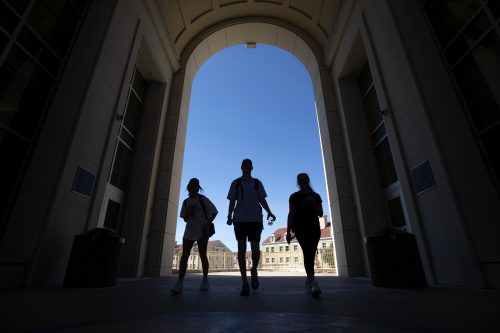
ROBERTSROB | ISTOCK | Getty Images
McNair Scholars Program Supports Students
The initiative aims to diversify tomorrow’s world of higher education.
As a student with limited resources and parents who did not attend college, Amy Lam ’21 entered TCU in 2017 with big dreams but without a lot of practical knowledge “about how to adult,” she said.
Budgeting, cooking nutritious meals and making graduate school a reality all seemed like intimidating aspirations until her junior year, when she became a McNair Scholar.
Conceived to encourage low-income, first-generation and underrepresented ethnic groups to pursue doctoral degrees and ultimately enter academia, McNair is part of the federal TRIO Programs, educational equity initiatives that began with Upward Bound in 1964.
Congress named the Ronald E. McNair Post-Baccalaureate Achievement Program in honor of the astronaut who was among those killed in the Challenger space shuttle explosion on Jan. 28, 1986.
As a McNair Scholar, Lam met every two weeks with the program’s director, Robin Melton, who retired shortly after Lam graduated.
She also sat down regularly with Omar Harvey, associate professor of geology. Lam, who majored in environmental science, completed a research project with Harvey. Such projects, a key component of the McNair program, help undergraduates prepare for graduate school.
“McNair is all about giving these upperclassmen the tools to succeed.”
Melondy Doddy
Lam said she felt a sense of community with her fellow McNair Scholars — 28 juniors and seniors at TCU. Pre-pandemic, the group gathered regularly at the University Recreation Center for workshops. Topics included graduate school applications, mental health, financial well-being and more, touching on everything from impostor syndrome to letters of recommendation.
The McNair Scholars also toured other colleges together, traveled for conferences and enjoyed off-campus cultural activities.
“It was a huge confidence booster to be part of such a supportive program,” said Lam, who began a doctoral program in soil and crop science at Cornell University last fall.
During her tenure as interim McNair director from July until September 2021, Melondy Doddy, a PhD candidate in TCU’s higher education leadership program, directed funds to purchase technology for the students, including digital notebooks called Rocketbooks.
“McNair is all about giving these upperclassmen the tools to succeed,” said Doddy, who noted that the program graduated its first TCU students in 1992.
Among McNair’s goals is helping students pursue advanced degrees immediately upon completion of their undergraduate education.
For the 2020-21 academic year, 57 percent of the program’s participants were Hispanic, 39 percent Black and 4 percent Native American. Seventy-one percent came from low-income families, and 75 percent were the first in their families to attend college.
Like Lam, Cecilia Esparza is a Community Scholar and receives assistances from Student Support Services, also a TRIO program. The senior electrical engineering major — a first-generation student who grew up in Fort Worth — said McNair helped her identify architectural acoustics as the area of study she’d like to pursue after she graduates in May.
“These programs gave me the help that I needed and that I couldn’t find at home,” Esparza said. “They helped me figure out a path that I wouldn’t have otherwise.”
As a self-styled connoisseur of information, V. David Russell ’12 arrived on campus from Detroit in the mid-2000s as a first-generation college student. (His mother, Seretha Russell, is on track to graduate from TCU in December with a degree in child development.)
Russell was a McNair Scholar and credits the program with helping him foster big-picture thinking.
“Grad school was something I would never have thought of, but McNair helped provide the financial capital and intellectual capital.”
V. David Russell
“Grad school was something I would never have thought of,” he said, “but McNair helped provide the financial capital and intellectual capital.”
After graduating as an accounting and finance major, Russell pursued a master’s degree in accounting at Oklahoma State University. A full-tuition scholarship funded his master’s degree in accounting. He’s now a managing director for a multifamily office based in Southern California.
Russell has also served as an adjunct professor in finance at the Neeley School of Business. One day he intends to go back to school to pursue a PhD in behavioral finance.
For Maya Vela ’21, the immediate plan is a master’s degree in women, gender and sexuality studies at George Washington University. She aspires to earn a PhD and become a professor like her mentor, Stacie McCormick, an associate professor of English.
Vela credited McCormick with introducing her to the McNair Scholars program. The news and media studies major said she appreciated the care McCormick took in editing her application essays for graduate school.
“Probably the best thing about McNair was that it provided me with a community of others who are like me and who were entering this stage of life together,” Vela said. “We could all relate to the experience of not knowing exactly what we were doing but running ahead full force anyway.”
The McNair program helps defray application and test preparation costs; most master’s and PhD programs require students to take the GRE.
Lam said her mentors also walked her through questions she should ask as an applicant meeting with prospective professors in doctoral programs.
“I would have been more stressed and less likely to apply to Cornell without McNair,” Lam said. “The program filled in gaps and made it so much easier to succeed in what I’m doing now.”
Here to Help
Student Support Services builds a foundation for success.
The Student Support Services initiative has become a lifeline for around 300 Horned Frogs, most of whom are overcoming financial disadvantages. Launched in 1968, the federal program helps participants with anything they might need to reach a college degree.
Student Support Services “gave me the home base to exist with other students who understood my background,” said Cynthia Montes ’07 (MEd ’11), director of TCU’s program.

Photo by Jeffrey McWhorter
Montes, under the guidance of Floyd Wormley Jr., associate provost for research and dean of graduate studies, created a separate program to support students majoring in STEM and health science-related fields. Currently, 160 students are in the original Student Support Services program, joined this year by 120 in the new version.
Students like Laurent Shumbusha, a senior criminal justice major, receive tutoring services, attend workshops and social gatherings, and participate in graduate school boot camps.
Shumbusha said learning from financial guru and media personality Dave Ramsey — an opportunity arranged by Student Support Services — during Shumbusha’s first year at TCU made a huge impact.
“It changed my whole perspective on money management,” said Shumbusha, whose family immigrated to Fort Worth from Zimbabwe when he was young. “I learned skills I never ever knew existed, like building credit.”
Student Support Services also awards grants to about 30 students to close the gap left by other aid and scholarship programs, Montes said. Students typically receive up to $1,300 for tuition costs. “Even that amount can mean the difference between a student staying home to work or going to TCU.”
The program changes lives, said participants including Ariela Martinez ’16 (MEd ’19), who was a transfer student when she enrolled at TCU.
“When I first got to TCU, I knew as a first-gen, low-income, minority student that I was blessed to be here,” she said, “but I constantly had this feeling that I didn’t belong.”
Everything changed after she began to participate in Student Support Services. She became a student ambassador for the group, helping to educate prospective students on what the program could do for them.
“I was able to connect with people who look like me and share what [the program] did for me,” said Martinez, now assistant director of graduate admission and recruitment in the Neeley School of Business and a EdD student in higher educational leadership. “We are like a family that helps you navigate going to college and beyond.”
For Montes, also in the midst of her doctoral program in counseling and counselor education, helping students thrive at TCU is a calling. She’s an enthusiastic spokesperson for Student Support Services and how it transforms lives.
“More than anything,” she said, “we want to bring greater awareness to the program with the goal of making sure that any student who needs our resources will have them.”

Your comments are welcome
Comments
Related reading:
Features
Making College a Reality
TCU’s College Advising Corps helps North Texas high school students plot their next steps.
Features
Rainwater Charitable Foundation Partners with TCU
The private family foundation has become a leading benefactor to TCU’s College Advising Corps.
Features
Community Scholars Bring New Perspectives
Scholarship program opens up a world of possibilities to North Texas’s underserved elite students.